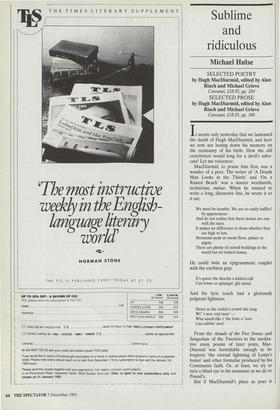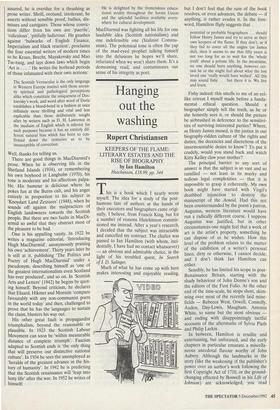Sublime and ridiculous
Michael Hulse
SELECTED POETRY by Hugh MacDiarmid, edited by Alan Riach and Michael Grieve Carcanet, £18.95, pp. 284 SELECTED PROSE by Hugh MacDiarmid, edited by Alan Riach and Michael Grieve Carcanet, £18.95, pp. 300 It seems only yesterday that we lamented the death of Hugh MacDiarmid, and here we now are hosing down his memory on the centenary of his birth. How the old crotcheteer would long for a devil's advo- cate! Let me volunteer.
MacDiarmid, to praise him first, was a wonder of a poet. The writer of 'A Drunk Man Looks at the Thistle' and 'On a Raised Beach' was a master wordsmith, technician, makar. When he wanted to write a long, discursive line, he wrote it so it sat:
We must be humble. We are so easily baffled by appearances And do not realise that these stones are one with the stars.
It makes no difference to them whether they are high or low, Mountain peak or ocean floor, palace or pigsty.
There are plenty of ruined buildings in the world but no ruined stones.
He could twist an epigrammatic couplet with the earthiest grip:
It's queer the thochts a kittled cull Can lowse or splairgin' glit annul.
And his lyric touch had a gloriously poignant lightness:
Sweet as the cushie's crowd she sang Wi"r wee reid mou' — Wha sauch-like i' the lowe o' luve Lies sabbin' noo!
From the Annals of the Five Senses and Sangschaw of the Twenties to the medita- tive essay poems of later years, Mac- Diarmid was formidable enough to be forgiven 'the eternal lightning of Lenin's bones' and other formulae produced by his Communist faith. Or, at least, we try to turn a blind eye to his nonsense as we do to Pound's.
But if MacDiarmid's place as poet is assured, he is overdue for a thrashing as prose writer. Shrill, orotund, intolerant, he asserts without sensible proof, bullies, dis- misses and castigates. Those whose convic- tions differ from his own are 'puerile', 'ridiculous', 'pitifully ludicrous'. He gnashes against 'bulwarks of English Finance, Imperialism and black reaction', proclaims the four essential writers of modern times to be Kraus, Brecht, Mayakovslcy and Mao Tse-tung, and lays down laws which begin 'Art is. . . .' He writes the hothead periods of those infatuated with their own notions:
The Scottish Vernacular is the only language in Western Europe instinct with those uncan- ny spiritual and pathological perceptions alike which constitute the uniqueness of Dos- toevsky's work, and word after word of Doric establishes a blood-bond in a fashion at once infinitely more thrilling and vital and less explicable than those deliberately sought after by writers such as D. H. Lawrence in the medium of English which is inferior for such purposes because it has an entirely dif- ferent natural bias which has been so con- firmed down the centuries as to be insusceptible of correction.
Well, thanks for telling us.
There are good things in MacDiarmid's prose. When he is observing life in the Shetland Islands (1934), or remembering his own boyhood in Langholm (1970), his tone is moderate and his affections palpa- ble. His humour is delicious where he pokes fun at the Burns cult, and his anger entirely in proportion to his subject in `Knoydart Land Zeizures' (1948), when he sounds off against the malpractices of English landowners towards the Scottish people. But there are two faults in MacDi- armid so awful that they obstruct most of the pleasure to be had. One is his appalling vanity. In 1922 he writes a magazine editorial, 'Introducing Hugh MacDiarmid', anonymously praising his own 'achievement'. Thirty years later he is still at it, publishing 'The Politics and Poetry of Hugh MacDiarmid' under a pseudonym, describing himself as 'one of the greatest internationalists even Scotland has ever produced', and so on. In 'Scottish Arts and Letters' (1942) he begins by quot- ing himself. Beyond criticism, he declares that Eluard, Hikmet and Montale 'compare favourably with any non-communist poets in the world today' and then, challenged to prove that he has the languages to sustain the claim, blusters his way out. His other great fault is propagandist triumphalism, beyond the reasonable or plausible. In 1923 the Scottish Labour Movement can soon be 'within measurable distance of complete triumph'. Fascism adapted to Scottish ends is 'the only thing that will preserve our distinctive national culture'. In 1934 he sees the unemployed as 'heralds of the greatest advance in the his- tory of humanity'. In 1942 he is predicting that the Scottish renaissance will 'leap into lusty life' after the war. In 1952 he writes of himself:
He is delighted by the tremendous educa- tional avidity throughout the Soviet Union and the splendid facilities available every- where for cultural development.
MacDiarmid was fighting all his life for one laudable idea (Scottish nationalism) and one indefensible one (Stalinist Commu- nism). The polemical tone is often the yap of the mad-eyed prophet talking himself into the delusions he hopes we'll share, infuriated when we won't share them. It's a demeaning read, and contaminates our sense of his integrity as poet.











































































 Previous page
Previous page